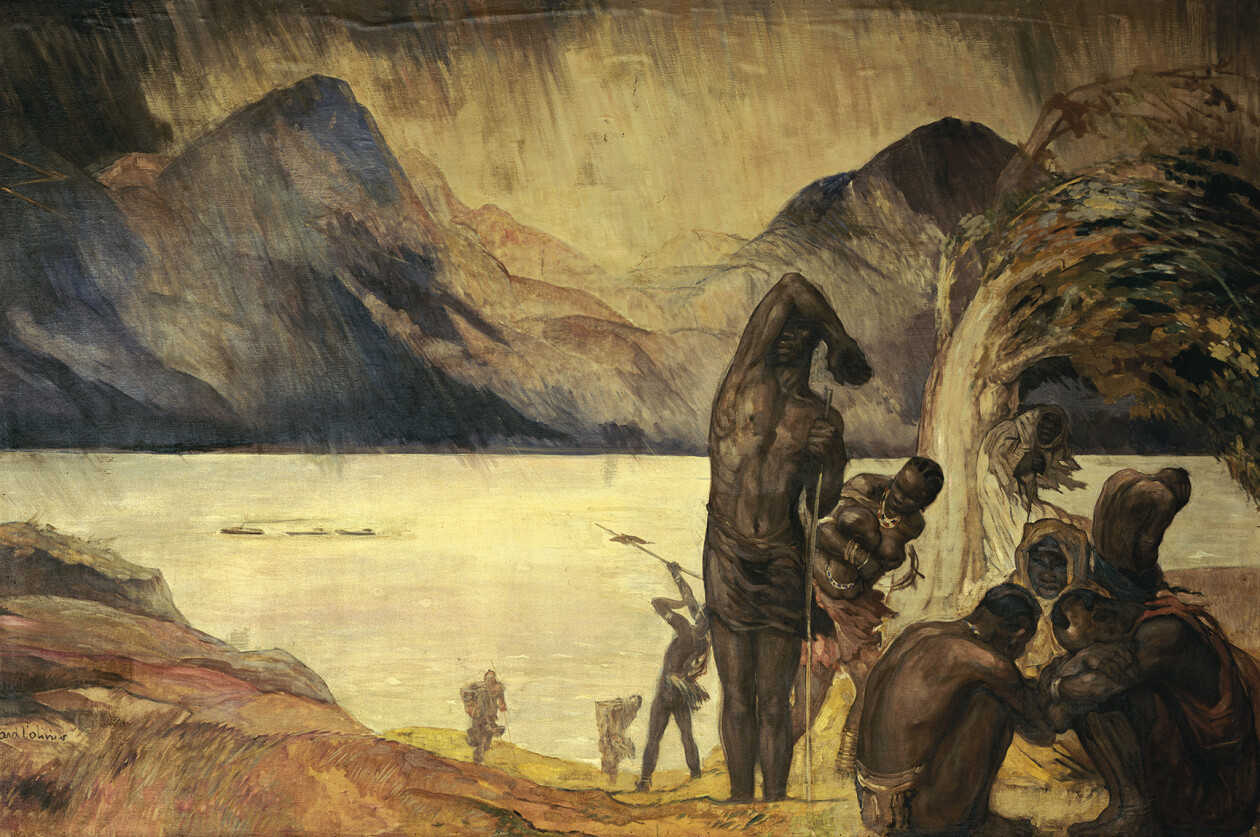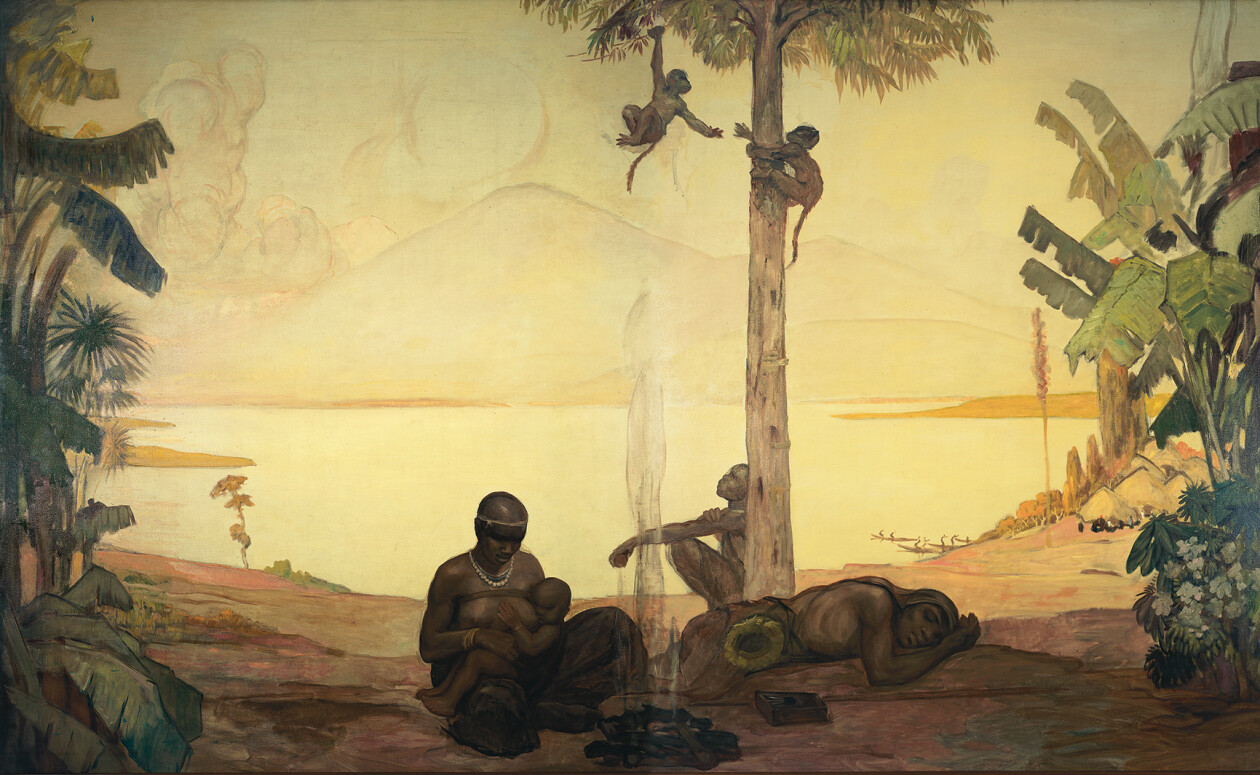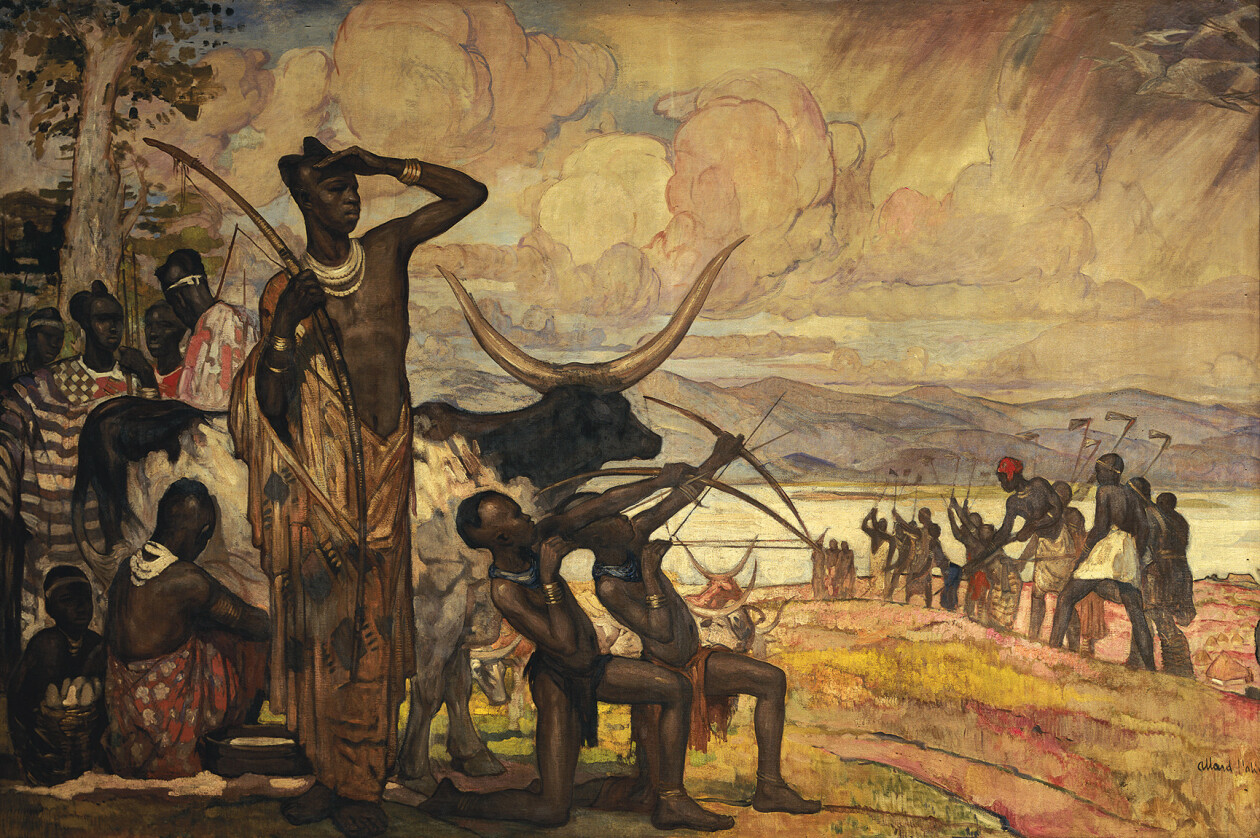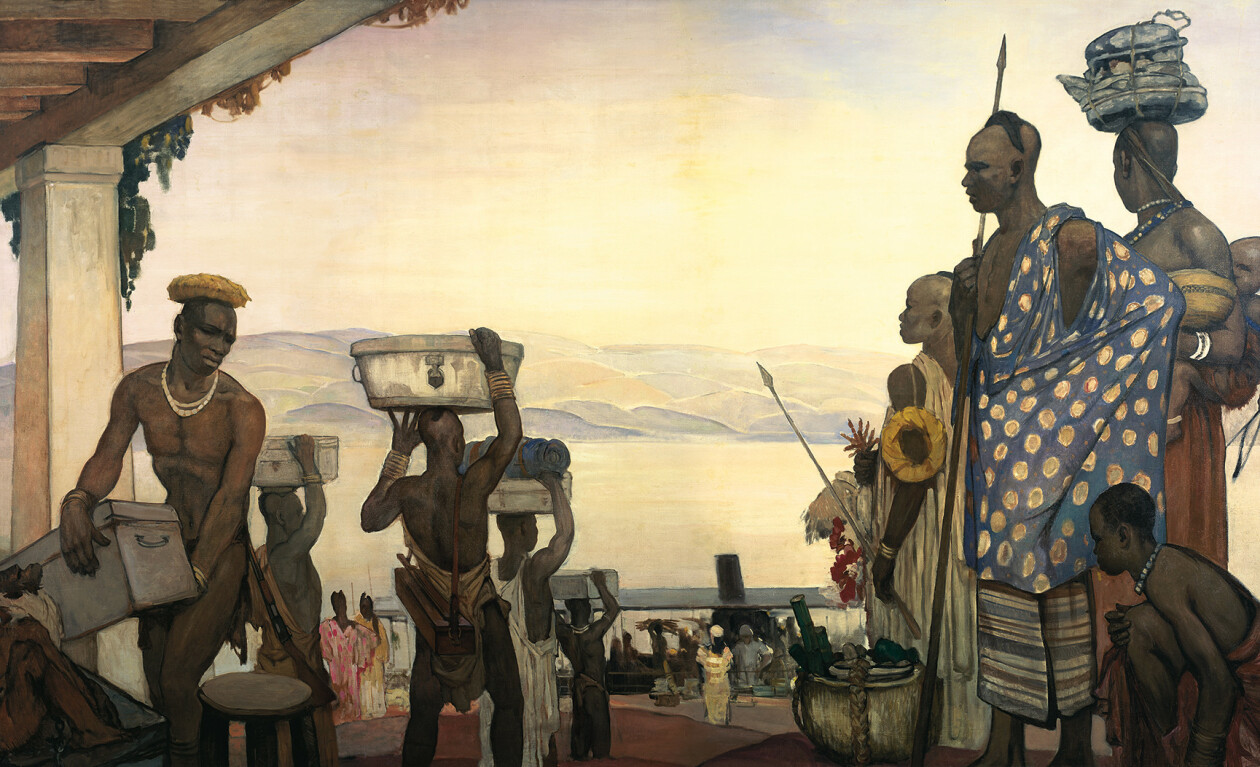
Paintings of Allard L'Olivier

FALO
The paintings in the Institute of Tropical Medicine were done by Fernand Allard L'Olivier (or 'FALO', the acronym by which Allard L'Olivier signs his paintings). They were made for the 1930 World's Fair in Antwerp and afterwards came to the Institute of Tropical Medicine. Currently, a number of paintings hang in the clinic and some in the main administrative building.
The series depicts the crossing of Lake Kivu, on the border between Rwanda and Congo. The painter departs at sunrise from Bukavu and sails past fields in full bloom and a procession of bearers. He braves the daily whirlwind and attends a folk dance. In the evening, he moors in Bobendana Bay.
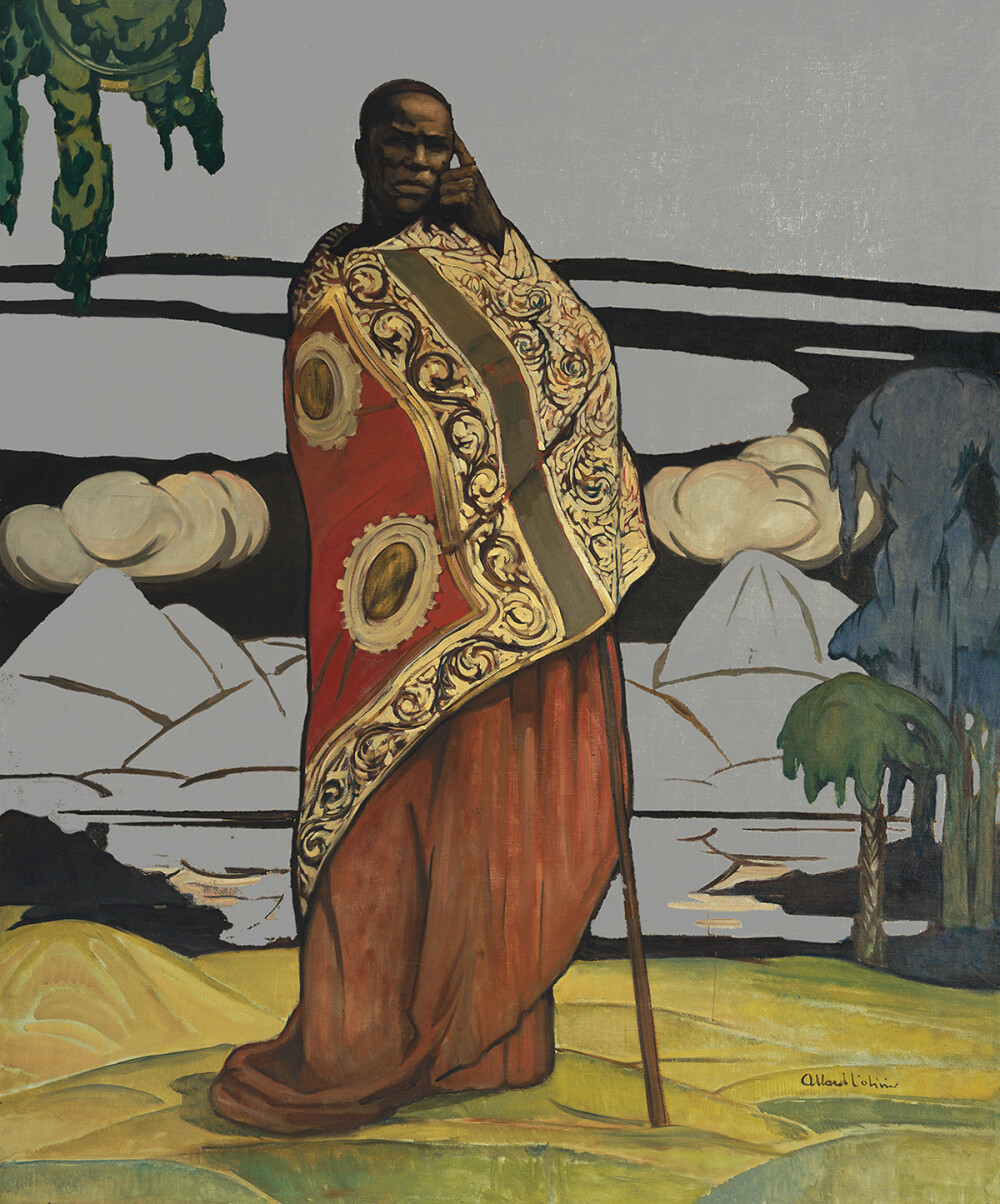
Africanism
FALO belonged to the Africanists, an art movement of the late 19th and early 20th centuries related to Orientalism.
These artists knew Africa through local travels and depicted the indigenous people in all their beauty and with an emphasis on ethnic differences. The Africanists ignored the influence of Western civilisation. For them, Africa was black, not white. Despite their admiration for Africans, the work of the Africanists was often part of colonial propaganda.
Drawing on the book Orientalism (1978) by Edward W. Said, one could argue that the work of the Africanists represents an essentialist rather than an idealised body of thought. African peoples are portrayed as 'noble savages' and reduced to an exotic essence.

FALO and colonialism
Congo Free State was a colony under the personal rule of King Leopold II of Belgium from 1876 to 1908, in which rubber export in particular played a major role. Epidemics, famine and violence reduced the size of the Congolese population by an estimated several million. International pressure after the publication of the Casement Report forced Leopold II to cede the colony to the Belgian government. After the abuses in the colony had come to light, the Belgian state had the greatest interest in cleaning up the colony's dark image. The state set up a comprehensive propaganda machine. Belgians who had never been to Congo were presented with a positive, exotic ideal image. The fact that villages revolted and people lost their lives in the process was never shown.

The Congo Palace at the world exhibition
The paintings of FALO are part of this colonial propaganda. FALO had wanted to travel to Africa for a long time. In the late 1920s, he contacted the Ministry of Colonies and asked for their help in realising his ambitious trip. As an itinerant painter, he needed guides and logistical support to practice his art. In exchange, he offered them drawings and paintings. The government then commissioned him to produce the series of paintings that still decorate ITM today.
From his correspondence with family and friends, we can conclude that FALO cherished a deep love for Congo and the Congolese people. He always spoke respectfully about the Congolese and disapproved of the way Belgian colonials
Correspondence of Allard L'Olivier
" ... That day, at 8 o'clock, I will take the white train that will bring me to Madimba around 5 o'clock in the evening, I will stay with Van Lancker's brothers-in-law. What can I expect from these people? I suspect, sympathetic farmers from Avelgem, who will look at me with some fear and a bit of disdain and who will be very concerned about their wallet. Here, we end up either with swooning admirers, like Madame T. who wrote to André (I'll come back to that) or with loafers who pretend to be honest but spout the worst nonsense. Quinine acts differently according to the intellect of individuals. The black [person] is infinitely more sympathetic to me and if I spoke their language, I think my journey would be twice as interesting and fruitful."
Letter to his wife - Matadi, 23 December 1932
"In reality, the crisis of which so much is spoken and which causes so much injustice is in many cases provoked by a spirit of routine and a lack of assimilation of present needs. The aviation camp at Luluabourg is being resolutely mown down and no aeroplane is landing there any more. The price of a black person's work is negotiated and he is forced to carry out exhausting tasks that make no sense. There is not a single white person who does not grumble about the black person's work skills, but on the other hand, one finds it more than appropriate to let him hang around for half an hour before one stretches out an arm to accept the letter that the black person respectfully hands over on a stick. I have a far too logical mind for a painter and this mind is constantly being shaken here. Mr Tshoffen comes along, he pleads for the economy, says the state is out of money, but on leaving the colony he gives three and a half million to the priest of Matadi, who already has a church, but who lives on ambition, and even more on the backs of others."
Letter to Van Oost of 13 February 1932
Source: Fernand Allard L'Olivier de Tournai à Yanonge (Belgique 12 juillet 1883 - Congo 9 juin 1933) : Oeuvres et lettres de voyages / Geneviève Allard-Gouinaud et Pierre Peeters; Jean-Michel Kibushi Ndjate Wooto, Jean-Claude Poinsignon, Marc Quaghebeur, Sandrine Smets.

Second and last journey
In November 1932, Allard l'Olivier left for Congo again. The government wanted to publish an album about Congo in order to attract more tourists. Allard was commissioned to make the illustrations.
On 9 June 1933 disaster struck. On the tugboat 'Flandre' Allard was painting scenes, portraits and landscapes. While doing so, he hit his head, causing him to fall into the muddy water. The current dragged him along. Three days later his body was found at Yanonge. FALO died before his 50th birthday.

